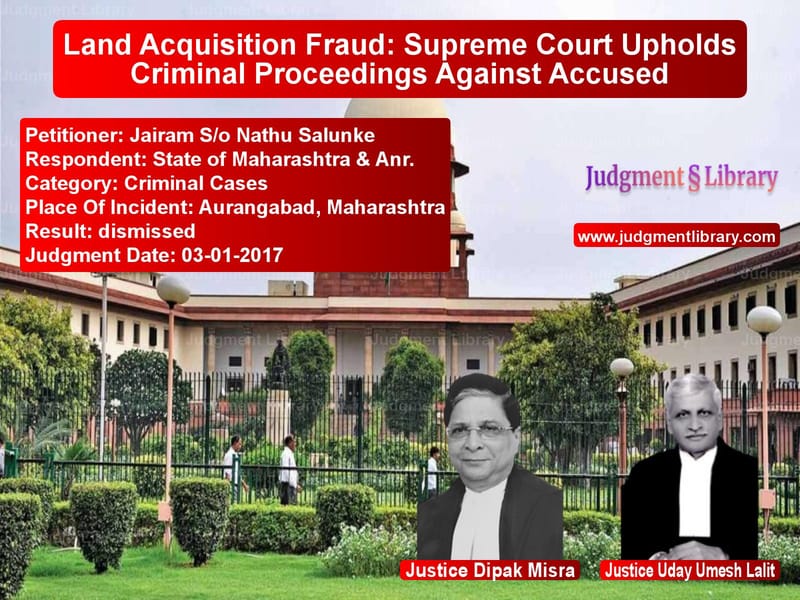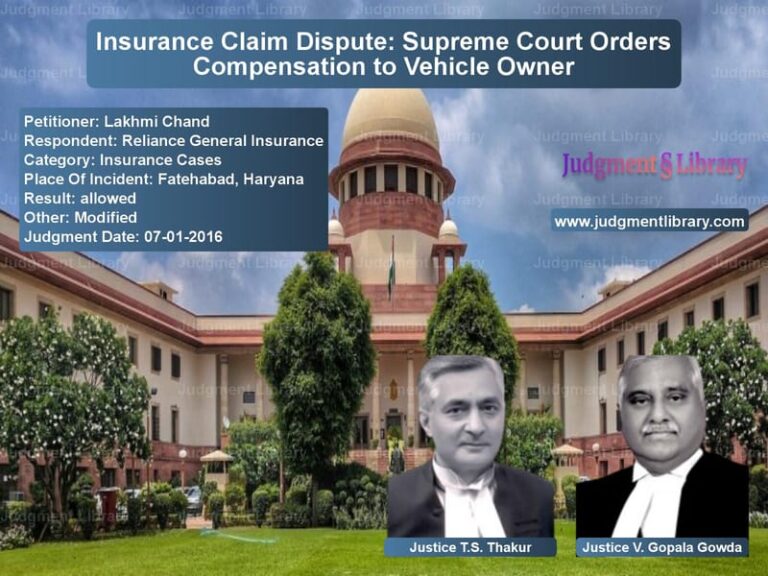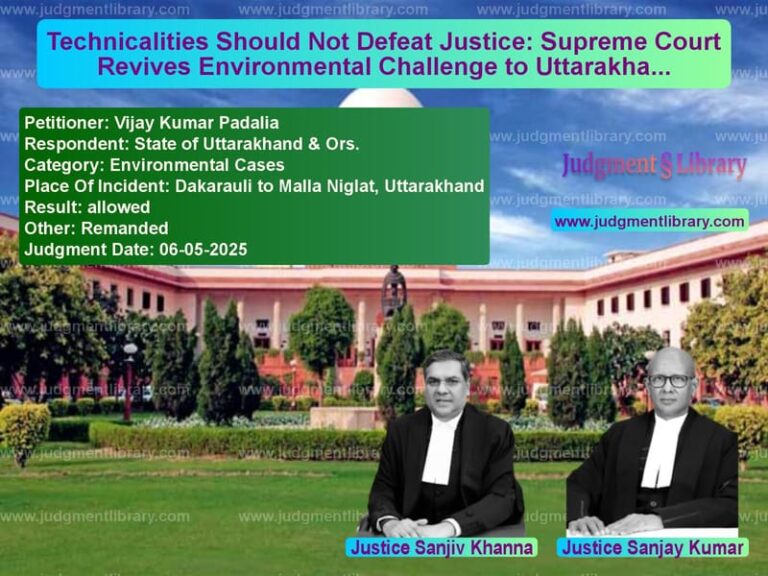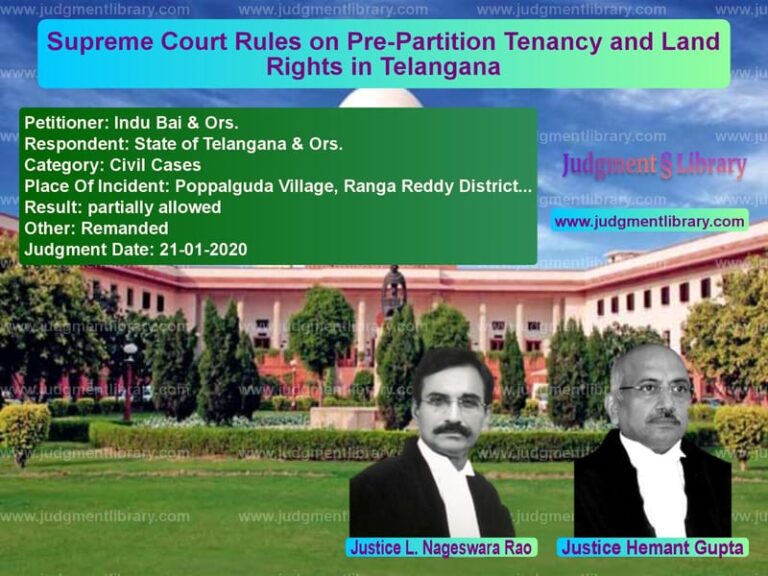Land Acquisition Fraud: Supreme Court Upholds Criminal Proceedings Against Accused
The Supreme Court of India, in the case of Jairam S/o Nathu Salunke vs. State of Maharashtra & Anr., upheld criminal proceedings against the appellant for allegedly securing compensation through fraudulent land acquisition claims. The case revolved around fabricating documents and wrongful claims on land compensation, leading to the registration of a criminal case against the accused under various sections of the Indian Penal Code (IPC).
Background of the Case
The case arose when an FIR was registered against the appellant, Jairam Salunke, along with three other accused, including a Special Land Acquisition Officer and a Planning Director. The complaint was filed by Purushottam Kulkarni, Assistant Director of Town Planning, Municipal Corporation, Aurangabad, alleging a conspiracy to illegally claim compensation for land acquisition.
According to the prosecution, fabricated documents were created, and compensation of Rs. 23.48 lakhs was wrongfully obtained by the appellant. The charge-sheet filed under Sections 406, 409, and 120-B of the IPC outlined that the accused, in connivance with officials, failed to verify ownership records properly and processed the claim based on fraudulent documents.
Petitioner’s Arguments
- The appellant contended that the dispute was of a purely civil nature and should not have led to criminal prosecution.
- It was argued that a lease agreement with certain landowners granted the appellant legitimate rights to the compensation received.
- The petitioner highlighted a compromise decree in Regular Civil Suit No. 81 of 1993, which recognized land ownership in favor of specific individuals who later leased the land to the appellant.
- The appellant claimed that the matter should have been adjudicated in a civil court rather than through criminal proceedings.
Respondents’ Arguments
- The State of Maharashtra contended that the appellant’s claim was fraudulent as no valid sale deed existed to transfer ownership rights to the parties he leased from.
- The prosecution argued that the appellant misrepresented ownership facts, and his claims were based on manipulated documents.
- The revenue and land records did not establish any legitimate title in favor of the alleged landowners.
- The Land Acquisition Officer failed to conduct proper due diligence, resulting in wrongful compensation.
Key Observations by the Supreme Court
- The Court noted that fraud and misrepresentation in land acquisition directly affect the State’s financial interests and cannot be treated as mere civil disputes.
- The High Court had identified critical inconsistencies in the appellant’s ownership claims, reinforcing the argument that false claims were made to extract compensation.
- The Court ruled that cases involving fraudulent claims in government schemes must be strictly scrutinized.
- It held that mere reliance on a civil suit decree without proper sale transactions could not establish ownership.
Final Judgment
The Supreme Court dismissed the appeal and affirmed the High Court’s ruling that the criminal proceedings were valid. The Court observed:
“If on the basis of false and fraudulent documents, a claim is made which leads to award of compensation in land acquisition matters, the interest of the State is certainly compromised or adversely affected. The matter cannot then be termed as a civil dispute simplicitor.”
The Court further stated that the appellant was free to present his defense in the trial court but found no grounds to quash the proceedings under Section 482 of the CrPC.
Implications of the Judgment
This judgment holds significant implications for land acquisition cases and government compensation claims:
- It establishes that fraudulent land acquisition claims constitute a criminal offense, not merely a civil dispute.
- The ruling reinforces due diligence requirements for government officials processing compensation claims.
- It sends a strong message against corruption and document forgery in land-related transactions.
- The judgment provides a precedent for handling similar fraudulent land acquisition disputes.
Conclusion
The Supreme Court’s decision in Jairam S/o Nathu Salunke vs. State of Maharashtra reaffirms that fraudulent compensation claims are punishable under criminal law. By upholding the High Court’s ruling, the judgment ensures that fraud in land acquisition processes does not go unchecked. This landmark ruling will serve as a deterrent against similar fraudulent claims in government compensation schemes.
Don’t miss out on the full details! Download the complete judgment in PDF format below and gain valuable insights instantly!
Download Judgment: Jairam So Nathu Sal vs State of Maharashtra Supreme Court of India Judgment Dated 03-01-2017.pdf
Direct Downlaod Judgment: Direct downlaod this Judgment
See all petitions in Fraud and Forgery
See all petitions in Judgment by Dipak Misra
See all petitions in Judgment by Uday Umesh Lalit
See all petitions in dismissed
See all petitions in supreme court of India judgments January 2017
See all petitions in 2017 judgments
See all posts in Criminal Cases Category
See all allowed petitions in Criminal Cases Category
See all Dismissed petitions in Criminal Cases Category
See all partially allowed petitions in Criminal Cases Category







